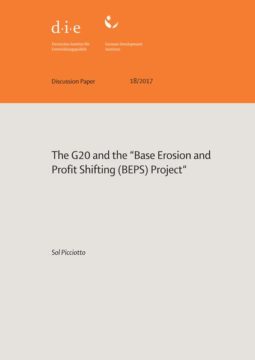This report provides a survey and analysis of the efforts to reform the rules on international corporate taxation under the project on base erosion and profit shifting (BEPS). This was launched in 2012 by the Organisation for Economic Cooperation and Development (OECD), and supported in 2013 by the G20 world leaders, adding participation in the work by non-OECD G20 countries, and subsequently some developing countries. The main outputs were delivered in October 2015, but key aspects are continuing, and all states have been invited to join the Inclusive Forum on BEPS.
The report begins with an overview of the legal and institutional arrangements for international coordination of corporate taxation, which date back to the League of Nations in the 1920s. It traces the interaction between the political concerns about taxation of multinational enterprises (MNEs) and the work of technical specialists, especially since the involvement of the G7 leaders from the mid-1990s, and then the G20 following the great financial crash. It analyses the flaws in international tax rules which led to concerns about double non-taxation and the techniques of tax avoidance which resulted in ‘stateless income’.
The main sections explain clearly and succinctly the measures put forward in the BEPS project reports, and assess their likely effects in attempting to solve the problem of BEPS. It discusses the challenges of implementation of the proposals, as well as the continuing agenda. It closes with an evaluation of the challenges for global tax governance, and discusses the contributions of the various actors involved in trying to meet them.
- Veröffentlicht am Samstag 14. Dezember 2024 von Deutsches Institut f. Entwicklungspolitik
- ISBN: 9783960210412
- 61 Seiten
- Genre: Gesellschaft, Politik, Sachbücher, Wirtschaft
